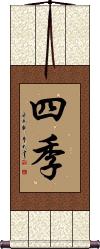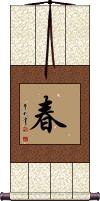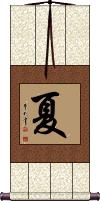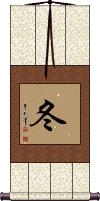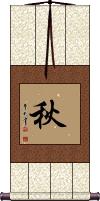Many custom options...
And formats...

Seasons in Chinese / Japanese...
Buy a Seasons calligraphy wall scroll here!
Personalize your custom “Seasons” project by clicking the button next to your favorite “Seasons” title below...
The Four Seasons
Short version
四季 is the 2-character way to say “Four Seasons.”
四季 literally means “4” and “seasons.”
The Four Seasons
春夏秋冬 is one way to express “The Four Seasons “ or “All Year Round “.
The characters here represent Spring, Summer, Autumn (Fall), and Winter.
Spring Season
Summer Season
夏 is the word/character used to describe the Summer season in Chinese, Korean and Japanese.
If your name is Summer, I like this character better than transliterating a few characters together to make something that sounds like “summer.”
Winter Season
冬 is the word/character used to describe the Winter season in Chinese and Japanese.
It also means winter in Korean Hanja, though a second character is usually added in Korean.
Autumn / Fall Season
This in-stock artwork might be what you are looking for, and ships right away...
Gallery Price: $72.00
Your Price: $39.88
Not the results for seasons that you were looking for?
Below are some entries from our dictionary that may match your seasons search...
| Characters If shown, 2nd row is Simp. Chinese |
Pronunciation Romanization |
Simple Dictionary Definition |
四季 see styles |
sì jì si4 ji4 ssu chi shiki しき |
More info & calligraphy: The Four Seasonsthe four seasons; (female given name) Yomogi |
春夏秋冬 see styles |
chūn xià qiū dōng chun1 xia4 qiu1 dong1 ch`un hsia ch`iu tung chun hsia chiu tung shunkashuutou / shunkashuto しゅんかしゅうとう |
More info & calligraphy: The Four Seasons(n,adv) (yoji) spring, summer, autumn (fall) and winter; the four seasons; (personal name) Hitotose |
期 see styles |
qī qi1 ch`i chi go ご |
a period of time; phase; stage; classifier for issues of a periodical, courses of study; time; term; period; to hope; Taiwan pr. [qi2] (1) time; moment; limit; (2) time of death; last moment; (3) (archaism) midnight in red-light districts during the Edo period; (surname) Ki A set time; a limit of time; times, seasons; to expect. |
雑 see styles |
zá za2 tsa zou / zo ぞう |
Japanese variant of 雜|杂 miscellany (classification of Japanese poetry unrelated to the seasons or to love); (surname) Saisaki |
三季 see styles |
sān jì san1 ji4 san chi miki みき |
(female given name) Miki The "three seasons" of an Indian year— spring, summer, and winter; a year. |
二季 see styles |
niki にき |
(1) two seasons; (2) (See 盆暮れ) Bon and year-end festivals; (female given name) Nikki |
八校 see styles |
bā xiào ba1 xiao4 pa hsiao hakkyō |
are the opening days of the four seasons and the two solstices and two equinoxes during which similar investigations are made. See also 三覆八校. |
四時 四时 see styles |
sì shí si4 shi2 ssu shih shiji; shiiji / shiji; shiji しじ; しいじ |
the four seasons, namely: spring 春[chun1], summer 夏[xia4], autumn 秋[qiu1] and winter 冬[dong1] (See 四季) the four seasons four seasons |
四気 see styles |
shiki しき |
weather of the four seasons (warmth of spring, heat of summer, cool of autumn, and cold of winter) |
四神 see styles |
shijin しじん |
(See 青竜・2,白虎・1,朱雀・1,玄武・1) four Taoist gods said to reign over the four directions; four gods said to reign over the four seasons |
四門 四门 see styles |
sì mén si4 men2 ssu men yotsukado よつかど |
(surname) Yotsukado The four doors, schools of thought, or theories: 有 is the phenomenal world real, or 空 unreal, or both, or neither ? According to the Tiantai school each of the four schools 四教 in discussing these four questions emphasizes one of them, i. e. 三藏教 that it is real 通教 unreal, 別通 both, 圓通 neither; v. 有 and 空, and each of the four schools. In esoteric symbolism the 四門 are four stages of initiation, development, enlightenment, and nirvana, and are associated with E., S., W., and N.; with the four seasons; with warmth, heat, coolness and cold, etc. |
持水 see styles |
chí shuǐ chi2 shui3 ch`ih shui chih shui Jisui |
Jātiṃdhara, a physician who adjusted prescriptions and diet to the seasons; reborn as Śuddhodana. |
春秋 see styles |
chūn qiū chun1 qiu1 ch`un ch`iu chun chiu shunjuu(p); haruaki / shunju(p); haruaki しゅんじゅう(P); はるあき |
spring and autumn; four seasons; year; a person's age; annals (used in book titles) (1) spring and autumn; spring and fall; (2) years; age; (3) (しゅんじゅう only) (See 五経) The Spring and Autumn Annals; The Chronicles of Lu; Chunqiu; Ch'un Ch'iu; (surname) Haruaki spring and autumn |
歲序 岁序 see styles |
suì xù sui4 xu4 sui hsü |
succession of seasons |
百八 see styles |
bǎi bā bai3 ba1 pai pa hyakuhachi ひゃくはち |
(numeric) (1) 108; one hundred and eight; (2) {Buddh} (See 煩悩・2) the number of kleshas, worldly thoughts and passions; (3) (See 七十二候,節気) the sum of 12 months, 24 seasons of the solar year, and 72 'climates' of one year; (given name) Hyakuhachi 108 |
節気 see styles |
sekki せっき |
24 divisions of the solar year; 24 terms used to denote the changing of the seasons |
輪迴 轮回 see styles |
lún huí lun2 hui2 lun hui rinne |
to reincarnate; reincarnation (Buddhism); (of the seasons etc) to follow each other cyclically; cycle; CL:個|个[ge4] cyclic existence |
雑節 see styles |
zassetsu ざっせつ |
standard days signifying the changing of the seasons (i.e. setsubun, higan, etc.) |
順時 see styles |
shùn shí shun4 shi2 shun shih |
according to the seasons |
三際時 三际时 see styles |
sān jì shí san1 ji4 shi2 san chi shih san zaiji |
The three Indian seasons, spring, summer, and winter, also styled熱, 雨, 寒時, the hot, rainy, and cold seasons. |
八王日 see styles |
bā wáng rì ba1 wang2 ri4 pa wang jih hachi ō nichi |
The eight royal days, i.e. the solstices, the equinoxes, and the first day of each of the four seasons. |
劫波樹 劫波树 see styles |
jié bō shù jie2 bo1 shu4 chieh po shu kōhaju |
kalpataru A tree in Indra's garden bearing fruit according to the seasons. |
夜摩天 see styles |
yè mó tiān ye4 mo2 tian1 yeh mo t`ien yeh mo tien yamaten やまてん |
{Buddh} (See 六欲天) heaven without fighting; one of the six heavens of the desire realm Yamadeva; the third devaloka, which is also called 須夜摩 or 蘇夜摩, intp. as 時分 or 善時分 the place where the times, or seasons, are always good. |
季節感 see styles |
kisetsukan きせつかん |
sense of the seasons; feeling of seasonality |
時雨忌 see styles |
shigureki しぐれき |
Matsuo Basho remembrance day (12th day of the 10th lunar month, associated with the change of the seasons) |
月雪花 see styles |
tsukiyukihana つきゆきはな |
(poetic term) (from a poem by Bai Juyi) (See 雪月花) moon, snow and flowers; beauty of the four seasons |
無熱池 无热池 see styles |
wú rè chí wu2 re4 chi2 wu je ch`ih wu je chih munetsu chi |
The lake without heat, or cold lake, called Mānasarovara, or Mānasa-saro-vara, 'excellent mānasa lake,' or modern Manasarovar, 31° N., 81° 3 E., 'which overflows at certain seasons and forms one lake with' Rakas-tal, which is the source of the Sutlej. It is under the protection of the nāga-king Anavatapta and is also known by his name. It is said to lie south of the Gandha-mādana mountains, and is erroneously reputed as the source of the four rivers Ganges, Indus, Śītā (Tārīm River), and Oxus. |
雪月花 see styles |
setsugetsuka; setsugekka せつげつか; せつげっか |
(poetic term) (from a poem by Bai Juyi) (See 月雪花) snow, moon, and flowers; beauty of the four seasons; (female given name) Yuzuha |
一日三秋 see styles |
yī rì sān qiū yi1 ri4 san1 qiu1 i jih san ch`iu i jih san chiu ichijitsusanshuu; ichinichisanshuu / ichijitsusanshu; ichinichisanshu いちじつさんしゅう; いちにちさんしゅう |
a single day apart seems like three seasons (idiom) (yoji) (waiting) impatiently; (spending) many a weary day; each moment seeming like an eternity |
七十二候 see styles |
shichijuunikou / shichijuniko しちじゅうにこう |
(See 節気,候・こう) the 72 microseasons of the year based on the 24 solar seasons further divided into 3 |
Click here for more seasons results from our dictionary
The following table may be helpful for those studying Chinese or Japanese...
| Title | Characters | Romaji (Romanized Japanese) | Various forms of Romanized Chinese | |
| The Four Seasons | 四季 | shi ki / shiki | sì jì / si4 ji4 / si ji / siji | ssu chi / ssuchi |
| The Four Seasons | 春夏秋冬 | shunkashuutou shunkashuto | chūn xià qiū dōng chun1 xia4 qiu1 dong1 chun xia qiu dong chunxiaqiudong | ch`un hsia ch`iu tung chunhsiachiutung chun hsia chiu tung |
| Spring Season | 春 | haru | chūn / chun1 / chun | ch`un / chun |
| Summer Season | 夏 | natsu | xià / xia4 / xia | hsia |
| Winter Season | 冬 | fuyu | dōng / dong1 / dong | tung |
| Autumn Fall Season | 秋 | aki | qiū / qiu1 / qiu | ch`iu / chiu |
Successful Chinese Character and Japanese Kanji calligraphy searches within the last few hours...
